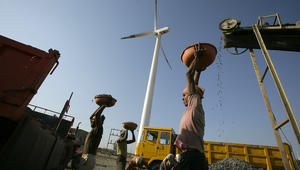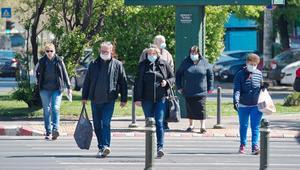Commentary
By Georgina Collins
27 May 2020
In my work, I often come up against the perception from MPs and constituents alike that climate change is an exclusively global issue, with little that should or can be done at a local level. However, meeting net-zero targets is fundamentally about transitioning to low carbon infrastructure, and many of the daily decisions around new and existing infrastructure, such as new buildings, roads and utilities, are made at the local level. So why has this generalised perception of climate change continued to be so pervasive?
To answer this, we must examine how the media has been reporting on the issue. Given that public opinion is inextricably linked to mass media, the role it has played in shaping the general public's perceptions of our changing climate should not be ignored.
It seems that the media has failed to report on the issue in a way that has inspired policy action significant enough to overcome the climate crisis. The public response to the media’s reporting on global pandemics is a good source of comparison. Or, as Hong Vu, lead author of a 2019 study on media framing of climate change summed up: "As communications researchers we want to know why, if climate change entered public discussion more than 30 years ago and we've been covering it as a global problem since, we can't slow the warming climate down".
Recognition requires coverage
The historical lack of media recognition given to climate change relates, in turn, to the lack of recognition by decision-makers such as MPs. Though coverage of climate change has increased in recent years, reporting on the issue in a way that is relevant and understandable to both the general public and MPs (rather than a ‘distant and abstract threat and visualization’) has remained a barrier to engagement.
Former press officer Nicole Valentinuzzi describes how the media can play a key role in agenda-setting within Parliament. Not only did ministers see the value of using the media as a vehicle to communicate their policies to the public (often an essential part of progressing in their careers), press coverage can effectively make the case for a policy within Parliament. As Jo Swinson noted; positive press coverage of her shared parental leave policy increased the cost to other MPs of opposing it.
Though in recent years things have certainly improved in the media’s reporting of climate change, it’s notable that until recently – and to an extent still – it remained a topic that decision-makers and media alike were hesitant to engage with. Over the last few years as the climate crisis has taken up greater space in the public consciousness, largely due the actions of Extinction Rebellion and the school strikers opening up a public discourse, the MPs we at Hope for the Future have engaged with have generally felt more comfortable to discuss what once was a fringe issue.
Local impact
Given the strong link between media coverage and public opinion, we need trusted voices speaking with authority in local and regional media, such as local elected representatives, climate scientists, energy professionals and faith leaders, in order to set a strong agenda on climate action.
Local media must also play a key role in making rigorous connections between local events and climate change, so that residents in the UK understand how climate change affects their lives, and subsequently why action is necessary. For instance, Alexander Stafford wrote passionately in the Yorkshire Post about the flooding his constituency experienced throughout 2019, explaining why this indicated the need to tackle climate change.
At Hope for the Future, we feel it is vitally important for communities around the UK that MPs and constituents have rich and challenging conversations about the climate crisis. Local, grassroots democratic engagement such as this will continue to be essential if we are hoping to transition equitably to a greener society. Local media can be a powerful tool to drive this community engagement; a 2016 study by King’s College London found UK towns whose local newspapers had suffered closure showed a ‘democracy deficit’ that resulted in measurably reduced community engagement by local people and a heightened mistrust of public institutions. This highlights why media is so important in the fight against climate change.
Increasing political mandate
Robust coverage of climate change from regional and local sources, will, in turn, lead to greater participation in the community and then a greater political mandate for MPs to work with. Regional news sources represent a large untapped resource for the climate movement. A 2018 YouGov poll in the UK found that three times as many people claimed they trusted local newspapers compared with social media. Local news is also amongst the most widely read, with 33.6 million people reading local media online each month.
Greater public support is needed in order to drive transformative political will to act on climate change, and the media remains a key way to drive this support. And as such, it is essential that the public see MPs and journalists engaging with both the local challenges, and solutions to, climate change. Current reporting does little to communicate its challenges and opportunities to communities across the UK at a local and regional level. Local media has the power to challenge apathy and inspire action, by making the challenge of climate change more discernible to MPs and constituents alike.
Georgina Collins is Media Outreach Officer for Hope for the Future, a climate communications charity that works to equip communities, groups and individuals across the country to communicate the urgency of climate change with local politicians




